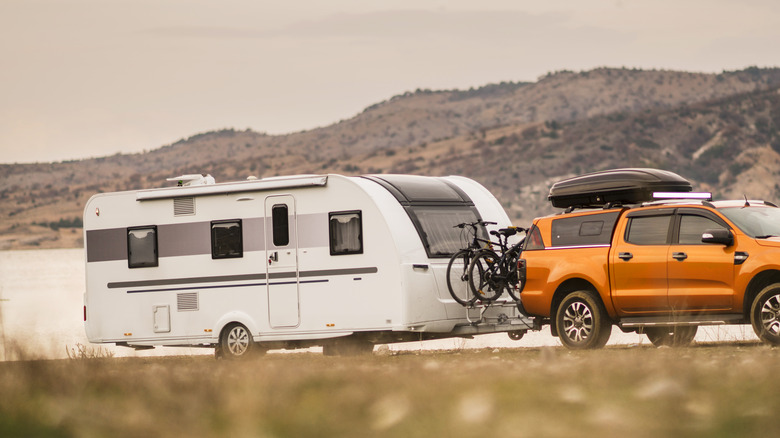Just Because Your RV Can Sleep Eight Doesn't Mean It Can Ride Eight Passengers (And Here's Why)
While many campervans advertise sleeping up to eight, that many passengers don't always fit when it comes time to drive (legally, at least). While RVs can often accommodate your whole party while stationary, docked at a campsite, many people underestimate how strict the laws for passengers will be. If you're embarking on a trip with friends or family this fall, it's time to take a closer look at the fine print on that campervan.
Contrary to what you see in movies and TV shows, while an RV is in motion, passengers should always be riding upright in a seat, buckled in. It's not required in every state, but it is generally considered to be the safest way to travel. In 49 out of 50 states (Live Free or Die in action in New Hampshire), RV passengers in the front seats must be wearing a seatbelt at all times. In a large percentage of others, everyone must be buckled. If that eight-sleeper camper doesn't have eight seats with seatbelts, for example, you'll need to have an extra vehicle with you for the trips between campsites in certain states.
Seatbelt laws vary from state to state for passengers in the rest of the RV. Some states, including California, require all passengers to be buckled in when the camper is in motion, even those in the back. In select states like Arizona, passengers in the back under the age of 15 need to wear a seatbelt.
What else do I need to know about traveling in an RV?
Some states are more lenient and will allow RV passengers to move around, lie down, and use the bathroom while the RV is in motion. In Indiana, home to the world's artsy RV capital, passengers in the back of an RV do not need seatbelts. This is something you'll need to look into, especially if you plan to cross state borders. You should also be aware of RV parking rules, especially in a public space like a Cracker Barrel parking lot.
Many people like to tow their RVs and campers behind them when they travel between campgrounds. Similar to seatbelt laws, it varies from state to state whether passengers are allowed to travel in a towed vehicle. In 39 states, passengers are not allowed to ride in a trailer camper. In 10 of the remaining states, it is permitted. Kansas allows it for passengers over the age of 14. It's best to confirm the law in your state before traveling.
This can become a complication if you need to sleep six or eight people, but can't travel with them all in tow. Similarly, the laws around open containers, marijuana, and guns kept on board will entirely depend on which state you're in (or traveling between). Generally, it's safest to assume you'll need a seatbelt for everyone on board, and enough space to comfortably fit your party in your trip's main vehicle, but you should double-check before the start of any trip. Keep an eye out for legislation changes as well; California's new law could cause a major shift in the RV sales industry as we know it.

